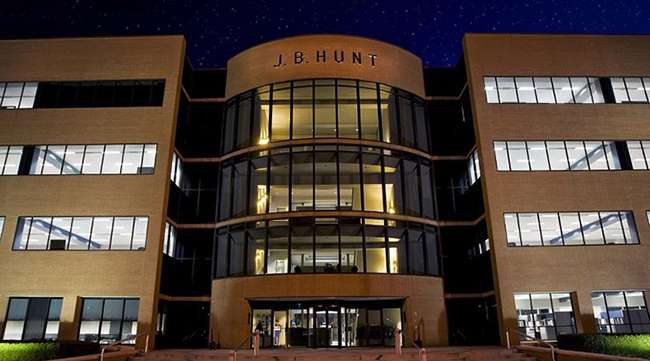Staff Reporter
J.B. Hunt Q3 Profit Slides 30.4% Year-Over-Year

[Stay on top of transportation news: Get TTNews in your inbox.]
J.B. Hunt Transport Services posted a 30.4% year-over-year decrease in profits in the third quarter, undershooting analyst expectations as revenues declined at each of the carrier’s operating units.
The company posted a profit of $187.4 million, or $1.80 per diluted share, in the most recent three-month period, compared with net income of $269.4 million, or $2.57 per diluted share, in the year-ago period.
J.B. Hunt ranks No. 3 on the Transport Topics Top 100 list of the largest for-hire carriers in North America and No. 5 on the TT Top 100 list of the largest logistics companies.
Lowell, Ark.-based J.B. Hunt reported revenue of $3.16 billion in the most recent quarter, a decrease of 18% from $3.84 billion a year earlier. It said revenue excluding fuel surcharges fell 15% year-over-year to $2.69 billion.
During the company’s earnings call Oct. 17, J.B. Hunt President Shelley Simpson said, “As you’ve heard us say since the fourth-quarter call earlier this year, we have been in a challenging freight environment or a freight recession, largely driven by excess inventory in the supply chain. Our customers have been working through excess inventory.
“And as we stated last quarter, we felt like that destocking trend started to moderate in June. As we sit here today, we see further evidence of this trend and most notably in our Intermodal business, which is at the forefront of the North American supply chain,” Simpson said.
“To be clear on the overall environment, we are not at a point yet to say we’re out of the freight recession, but we do feel like we’re coming out of it,” she added.
Consensus analyst expectations for the most recent quarter were for a profit of $1.90 per share and revenue of $3.25 billion, according to Zacks Equity Research.
JPMorgan Chase & Co. analyst Brian Ossenbeck said in a note Oct. 18 that he expected J.B. Hunt to lead much of the “sector lower as management maintained the view that the market was still moving out from the freight recession while the highly anticipated return to intermodal volume growth failed to generate any clear operating leverage.”
The weaker profit and fall in revenue was primarily driven by a 14% and 22% decrease, respectively, in Intermodal (JBI) and Truckload (JBT) revenue per load, excluding fuel surcharge revenue, J.B. Hunt said. The Intermodal and Truckload units accounted for 49% and 6% of the company’s revenues in the most recent quarter.
J.B. Hunt also saw a 38% decrease in volume at its Integrated Capacity Solutions (ICS) unit, a 20% decrease in stops for its Final Miles Services (FMS) operations, and a 1% decline in average revenue producing trucks at Dedicated Contract Services (DCS).
The JBI unit saw a 15% year-on-year decrease in revenue to $1.56 billion and a 41% slide in operating income in the most recent quarter.
Intermodal volume increased 1% year-over-year in the most recent three-month period. Eastern network loads decreased 3%, while transcontinental loads increased 4%, the parent company said.
Darren Field, head of the company’s Intermodal operations, said during the call: “We are seeing a slight uptick in demand across some of our end markets in this segment, although furniture deliveries remain in a tough spot.”
“JBI’s top line actually beat our estimate, but it wasn’t enough to offset additional fixed costs and one more step down in revenue per load while operating profit per utilized container fell another 11%” compared with the second quarter of 2023, Ossenbeck said.
Trimble CEO Rob Painter discusses the company’s continued investment in the freight transportation industry and its vision for a more connected supply chain. Tune in above or by going to RoadSigns.ttnews.com.
At the DCS unit, Q3 revenue slid 4% year-over-year to $892 million, while operating income saw a similar percentage decline to $102.4 million. Customer retention in the quarter was about 94%, it added. The DCS unit accounted for 28% of overall revenue in the most recent quarter, compared with 24% a year earlier.
J.B. Hunt’s ICS unit saw revenue slump 48% year-over-year in Q3 to $298 million and the segment turned in an operating loss of $9.4 million, after posting a $13.4 million operating profit in the third quarter of 2022.
ICS’ revenue per load decreased 17% year-over-year due to lower contractual and transactional rates and changes in customer freight mix, the company said. Contractual volume represented around 68% of total load volume and 67% of total revenue in the most recent quarter, compared with 49% and 52% in the year-ago period.
The company’s FMS unit reported Q3 revenue of $226 million, down 15% year-on-year, but its operating income rose 33% on the year to $13 million. J.B. Hunt said the increase was largely the result of “internal efforts to improve revenue quality and manage costs,” although this was partially offset by higher equipment-related expenses, technology investments, and inflationary increases in facility rental expenses.
J.B. Hunt’s Truckload unit posted $196 million in revenue in Q3, down 17% year-on-year, while its operating income fell 48% to $7.7 million. The segment’s operating income declined due to higher purchased transportation expenses, equipment-related and maintenance expenses, insurance costs, and higher technology expenses, it said.
Want more news? Listen to today's daily briefing below or go here for more info:





